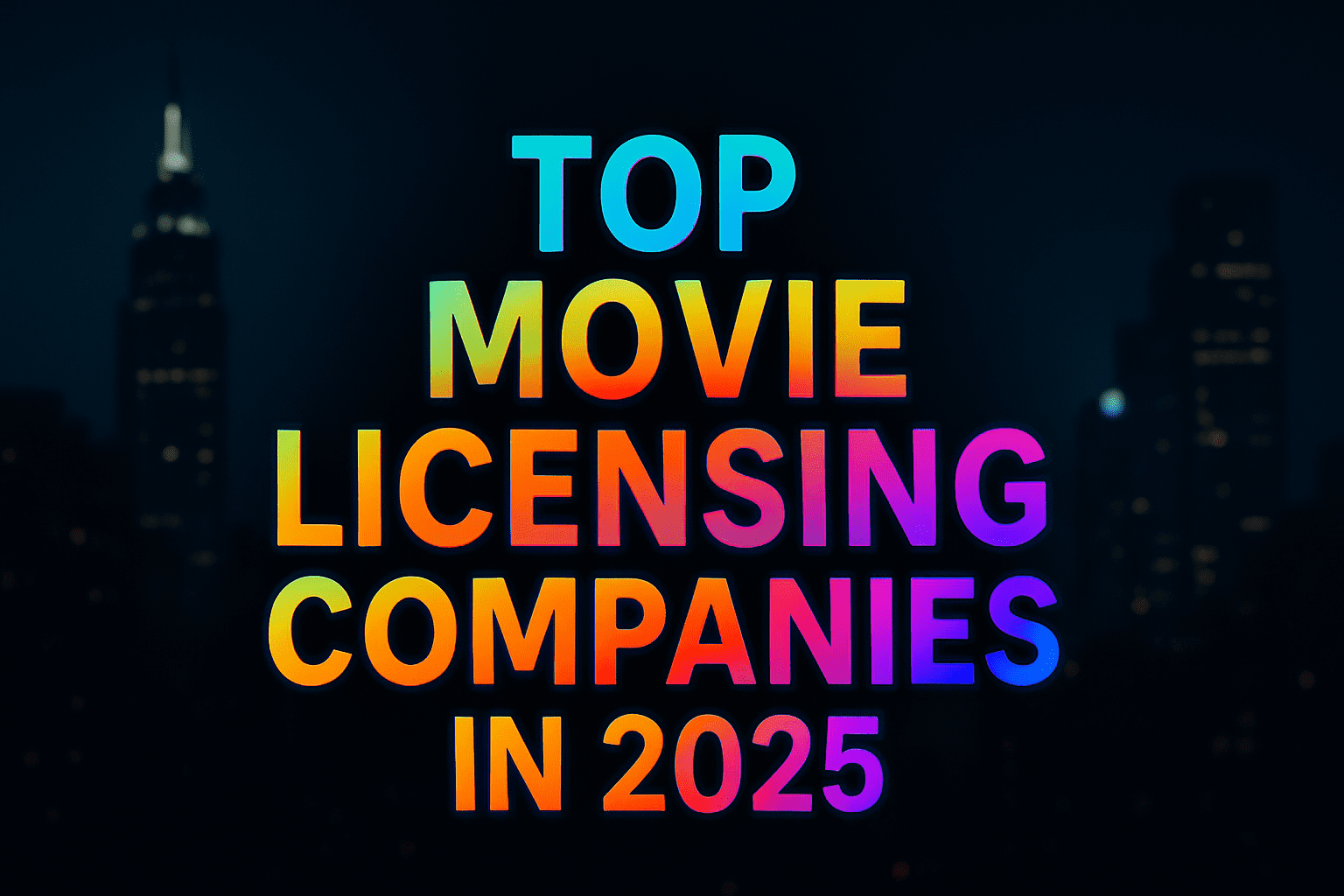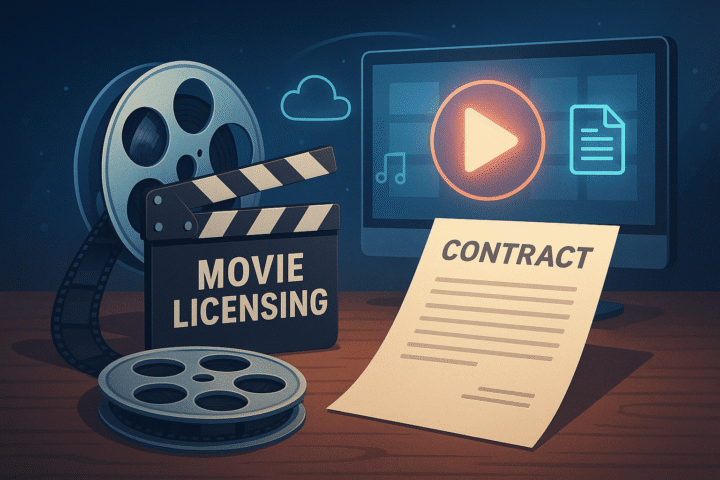A Guide to Top Movie Licensing Companies in 2025

Introduction
In the global media and entertainment sector, the strategic licensing of film and television content is the primary mechanism for monetization and audience expansion.
For producers, studios, and investors, securing partnerships with the Top Movie Licensing Companies is not merely a transactional step; it is a critical decision that dictates a property’s commercial trajectory, market penetration, and long-term brand value.
These companies serve as the essential bridge between content creators and a fragmented global ecosystem of broadcasters, streaming platforms, and ancillary markets.
Understanding the key players and their strategic specializations is fundamental for any executive tasked with maximizing the value of intellectual property in a highly competitive landscape.
Table of content
- Setting the Stage: The Modern Movie Licensing Ecosystem
- Our Evaluation Framework for Top Movie Licensing Companies
- Top 10 Movie Licensing Companies
- How to Integrate These Partners into Your Content Strategy
- How Vitrina Enhances Your Licensing and Distribution Strategy
- Conclusion
- Frequently Asked Questions
Key Takeaways
| Core Challenge | Identifying and vetting suitable movie licensing partners with the right territorial access, platform relationships, and genre expertise. |
| Strategic Solution | Evaluating licensing companies based on their catalog strength, global network, deal-making track record, and adaptability to new distribution models. |
| Vitrina’s Role | Vitrina provides a real-time, global database for discovering, qualifying, and connecting with movie licensing companies and key decision-makers. |
Setting the Stage: The Modern Movie Licensing Ecosystem

The movie licensing market is in a state of profound transformation, driven by the explosive growth of streaming services and the increasing globalization of content consumption.
According to a 2025 market analysis, the global movie licensing market is projected to grow significantly, fueled by the insatiable demand for content from Over-The-Top (OTT) platforms.
This digital shift has fragmented the traditional distribution window model, creating a more complex but opportunity-rich environment. Licensing deals are no longer confined to rigid, long-term theatrical and broadcast agreements.
Today, they encompass a sophisticated matrix of rights, including SVOD, AVOD, TVOD, and FAST channels, each requiring specialized negotiation and management.
This landscape demands that content owners be more strategic than ever. The value of a film or series is now determined by its ability to be licensed across multiple territories and platforms, often simultaneously.
Success depends on partnering with licensing companies that possess not only a vast network of buyers but also a deep understanding of emerging digital trends and regional market nuances.
As major studios and streamers compete fiercely for exclusive content, the role of specialized licensing agents and distributors in connecting independent productions with global audiences has become increasingly critical.
For executives, navigating this ecosystem requires access to accurate, real-time intelligence on who is acquiring what, and on what terms.
Our Evaluation Framework for Top Movie Licensing Companies
To identify the leaders in the movie licensing space, I have established a framework based on four key performance indicators. The companies selected for this guide have demonstrated excellence across these areas, proving their ability to effectively monetize intellectual property and forge strategic, high-value partnerships in the global entertainment market.
- Global Distribution Network & Market Access: This criterion evaluates the breadth and depth of a company’s relationships with broadcasters, streaming platforms, and distributors across key international territories. A top-tier licensing company must have a proven ability to place content in both mature and emerging markets.
- Catalog Strength & Diversity: The quality and variety of a company’s content catalog are a direct reflection of its industry standing. This analysis considers the presence of high-profile, commercially successful films and television series, as well as a diverse slate that spans multiple genres and formats.
- Strategic Partnerships & Major Studio Alliances: The ability to secure and manage licensing deals for major Hollywood studios, leading independent producers, and global streaming platforms is a key indicator of a company’s influence and operational capacity. These partnerships demonstrate a high level of trust and expertise.
- Adaptability & Innovation: The modern licensing landscape is defined by rapid change. This criterion assesses a company’s ability to adapt to new business models, such as SVOD-exclusive deals and FAST channel programming, and to innovate in its approach to rights management and monetization.
Top 10 Movie Licensing Companies
The following companies represent the global leaders in film and television content licensing. Each is recognized for its extensive distribution network, valuable intellectual property portfolio, and strategic influence on how content flows across international markets.
These organizations are the key intermediaries driving cross-border licensing and global content monetization in the modern entertainment economy.
-
Netflix
Netflix operates one of the most extensive content licensing programs in the world. In addition to its original productions, the streamer licenses thousands of films and series from third-party studios and distributors, expanding its global catalog and reach. Its data-driven acquisition strategy makes it a vital partner for rights holders seeking worldwide visibility and multi-region exposure.
-
The Walt Disney Company
Through Disney Entertainment, ESPN, and its network of subsidiaries, The Walt Disney Company manages one of the most valuable content libraries in existence. Disney’s licensing activities span theatrical distribution, broadcast syndication, and digital streaming, enabling the company to monetize its IP across multiple global platforms while preserving brand and market control.
-
Warner Bros. Discovery
With a vast library that includes Warner Bros., HBO, and Discovery properties, Warner Bros. Discovery remains one of the world’s most influential licensors. The company licenses content across every major territory, balancing global distribution partnerships with the growth of its own streaming platform, Max. Its IP portfolio spans nearly a century of iconic film and television assets.
-
WildBrain
WildBrain is a global leader in kids’ and family entertainment, managing an extensive library of beloved franchises. The company’s licensing division works with broadcasters, streaming platforms, and consumer product partners to extend the reach of properties like Peanuts and Teletubbies. Its brand-driven licensing model makes it a top choice for youth-focused content collaborations.
-
NTV
Nippon Television Network Corporation (NTV) is Japan’s leading media company with a robust international licensing arm. The company’s portfolio includes scripted dramas, unscripted formats, and an extensive anime catalog. NTV’s global partnerships have established it as a key conduit for Asian content entering international markets.
-
Gaumont
As one of the oldest studios in the world, Gaumont remains a powerhouse in production and global content licensing. Its television division handles the worldwide distribution of high-end drama and animation, with an emphasis on quality co-productions and long-term international partnerships that extend across multiple genres.
-
RTBF
The French-speaking public broadcaster of Belgium, RTBF is active not only in domestic production but also in the licensing of its original dramas, documentaries, and children’s programming. Its commercial division supports international distribution and co-production partnerships for culturally rich European content.
-
Fremantle
Fremantle is one of the world’s largest producers and distributors of entertainment content. With thousands of hours of programming in its catalog—including globally franchised formats like Got Talent and Idol—Fremantle’s distribution arm plays a central role in global content licensing and international co-production.
-
Lionsgate
Lionsgate is a leading independent studio with a strong global licensing and distribution network. Its catalog features major franchises such as John Wick and The Hunger Games, as well as premium television content. The company’s licensing operations span linear television, streaming, and digital rights management.
-
CJ ENM Co.
CJ ENM is South Korea’s leading media and entertainment conglomerate, driving the global expansion of Korean content through strategic licensing. Its international distribution arm manages a vast library of dramas, films, and unscripted formats, establishing CJ ENM as a key bridge between Asian and Western content markets.
How to Integrate These Partners into Your Content Strategy
Engaging with the top movie licensing companies requires a strategic and well-prepared approach. The first step is to conduct a thorough analysis of your own content, identifying its genre, target audience, and unique selling propositions.
This self-assessment is crucial for pinpointing which of the companies on this list are the best fit. For example, a producer of children’s animated content would naturally prioritize outreach to a company like WildBrain, while a creator of high-end Korean drama would focus on CJ ENM.
Once you have a shortlist of potential partners, the next phase is to prepare a professional pitch package. This should include a high-quality screener, a concise synopsis, key art, and a summary of any existing press or festival accolades.
When initiating contact, it is essential to be specific about the rights you are offering and the territories you are targeting. Understanding the basics of film licensing agreements will enable you to have more productive conversations.
Building relationships is key; attending major film and television markets like MIPCOM and the American Film Market can provide valuable face-to-face opportunities.
However, a direct, data-informed approach, based on a company’s recent acquisitions and stated content needs, will always be the most effective strategy.
How Vitrina Enhances Your Licensing and Distribution Strategy
In the fast-paced global content market, having access to timely and accurate data is a significant competitive advantage. Vitrina is a specialized business intelligence platform designed to meet this need.
It provides a comprehensive, constantly updated database of companies across the entire media and entertainment supply chain, including the top movie licensing companies. Instead of relying on manual research or outdated industry directories, executives can use Vitrina to quickly identify and qualify potential partners.
The platform allows you to filter companies by their area of specialization, the territories they operate in, and even the specific types of content they are actively acquiring.
Vitrina’s project tracking capabilities provide invaluable intelligence, showing you which companies are making deals and what kind of content is in demand. This data-driven approach allows you to tailor your outreach with a high degree of precision, increasing your chances of securing a favorable deal.
By streamlining the discovery and vetting process, Vitrina empowers content owners to build more effective distribution and licensing strategies and accelerate their speed to market.
Conclusion
The global movie licensing landscape is more complex and dynamic than ever before, but it also presents unprecedented opportunities for content creators. The companies featured in this guide are the industry leaders who control the primary pathways to the global marketplace.
Partnering with the right licensing company—one that aligns with your content’s genre, scale, and strategic objectives—is the most critical factor in achieving widespread distribution and maximizing revenue.
A successful licensing strategy requires a deep understanding of the market, a targeted approach to partner selection, and a clear articulation of your content’s value.
In an environment defined by data, leveraging a specialized platform like Vitrina can provide the critical intelligence needed to make smarter, faster decisions. By connecting with the right partners, content owners can ensure their creative work reaches its full global audience and commercial potential.
Frequently Asked Questions
A licensing company typically manages the rights for a piece of content, selling those rights to various distributors in different territories or on different platforms. A distributor is the entity that then handles the actual release of the content in a specific market, whether theatrically, on television, or via streaming. However, the roles can often overlap, with large companies handling both.
A movie licensing deal is a legal agreement where the content owner (licensor) grants a third party (licensee) the right to distribute and exhibit a film for a specific period of time, in a specific territory, and on specific platforms. The terms typically include a licensing fee, which can be a flat rate, a percentage of revenue, or a minimum guarantee against future earnings.
Key terms in a licensing agreement include the scope of the rights (e.g., theatrical, SVOD, free TV), the territory covered, the duration of the license, the licensing fee and payment structure, and any marketing commitments from the licensee. It is also important to clarify sub-licensing rights and the handling of materials and deliverables.
The rise of streaming has dramatically increased the demand for licensed content and created new, lucrative revenue streams for rights holders. It has led to more complex deal structures, including exclusive “buy-out” deals where a platform acquires global rights for a fixed term. This has made the role of expert licensing companies even more crucial in navigating the opportunities and challenges of the digital marketplace.

























